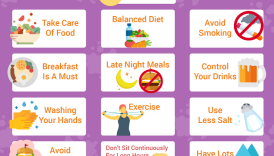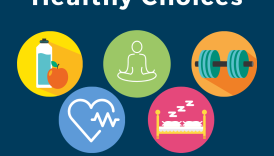Creating Sustainable Habits for a Healthier You

Benefits of Sustainable Habits
Improved Physical Health
Adopting sustainable habits can lead to significant improvements in physical health. When individuals embrace a lifestyle centered around sustainability, they often find themselves making healthier choices, which in turn decreases the risk of chronic diseases. For instance, opting for fresher, locally-sourced foods not only supports the community but also ensures that the meals consumed are packed with nutrients. This shift can lead to:
- Creating Sustainable Habits for a Healthier You
- Benefits of Sustainable Habits
- Improved Physical Health
- Better Mental Well-being
- Setting Realistic Goals
- Establishing a Routine
- Tracking Progress
- Eating Well for Long-Term Health
- Importance of Balanced Nutrition
- Meal Prep and Planning
- Staying Active and Fit
- Incorporating Exercise into Daily Life
- Finding Activities You Enjoy
- Prioritizing Self-Care
- Stress Management Techniques
- Importance of Quality Sleep
- Weight Management: With a focus on whole foods, individuals may naturally lower their caloric intake and increase their engagement with physical activities, promoting a healthy weight.
- Enhanced Energy Levels: By consuming nutritious meals and staying active, energy levels can increase, making daily tasks feel less overwhelming.
- Reduced Risk of Illness: Incorporating more fruits, vegetables, and whole grains helps strengthen the immune system, making the body less susceptible to illnesses.
Consider John, who decided to cultivate a small garden. Initially meant to save on grocery bills, he found his physical health improving drastically. With the extra produce, he cooked healthier meals. This decision led to more energy and a positive impact on his overall well-being.
Better Mental Well-being
The advantages of sustainable habits extend beyond the physical realm to mental wellness as well. Engaging in practices that benefit the planet often instills a sense of purpose, leading to:
- Lower Stress Levels: By prioritizing activities like meditation, nature walks, and community service, individuals can find tranquility and reduce anxiety.
- Improved Mood: Physical activities, often a natural part of sustainable living, release endorphins that enhance mood and promote happiness.
- Increased Connection with Nature: Spending time outdoors, whether through gardening, hiking, or participating in community clean-ups, fosters a connection with the environment, which is known to elevate one’s spirits.
For instance, Maria, after adopting a more eco-conscious lifestyle, noticed a remarkable reduction in her stress levels. Activities like hiking or joining community gardening sessions became not just hobbies but soothing escapes that contributed to her mental clarity and happiness. In conclusion, the benefits of sustainable habits encompass both physical and mental health improvements, illustrating the interconnectedness of our well-being and our relationship with the environment.
Setting Realistic Goals
Establishing a Routine
Once individuals recognize the multitude of benefits derived from sustainable habits, the next step is to set realistic goals. A well-structured routine serves as the backbone of this journey, providing a framework that simplifies the process of incorporating these habits into daily life. A consistent routine can help in establishing new, sustainable practices that stick. For example:
- Morning Affirmations: Start the day with positive affirmations, setting a motivating tone for the day ahead.
- Meal Times: Designate specific times for meals and snacks, which can promote better nutrition and discourage impulsive eating.
- Scheduled Exercise: Carving out time for physical activity, whether it’s a morning jog or an evening yoga session, ensures that staying active becomes a regular part of life.
Take Sarah, who struggled to maintain healthy habits. By creating a daily plan that included meal prepping on Sundays and evening walks, she turned her good intentions into actions. This structured framework not only made her goals feel manageable but also transformed her lifestyle gradually.
Tracking Progress
Equally as important as setting up a routine is tracking progress. Monitoring one’s journey allows for adjustments, celebrates successes, and maintains motivation over time. A few effective ways to track progress include:
- Journaling: Keeping a daily or weekly journal can provide insights into what is working and what needs tweaking. Writing down achievements, no matter how small, can serve as a great motivator.
- Apps and Tools: Utilizing technology brings tracking to a new level. There are numerous apps designed for goal-setting that allow users to log activities, meals, or mindsets.
- Visual Charts: Creating visual goal charts or calendars adds a fun element. For instance, color-coding completed tasks can carry a sense of accomplishment.
For example, Mark used a simple habit tracker app to monitor his water intake and exercise frequency. Over time, seeing his consistent efforts reflected on the screen spurred him to stay committed to his goals. In summary, establishing a routine and actively tracking progress not only eases the journey towards sustainable habits but also maintains motivation. This systematic approach fosters personal growth, ensuring that the desired lifestyle shifts remain enjoyable and achievable.
Eating Well for Long-Term Health
Importance of Balanced Nutrition
As individuals embark on their journey towards sustainable habits, one core aspect that often emerges is the importance of eating well for long-term health. Balanced nutrition isn’t just about filling the plate; it’s about providing the body with essential nutrients that can lead to robust health and improved quality of life. A balanced diet typically includes:
- Fruits and Vegetables: These are packed with vitamins, minerals, and antioxidants. Aim for a colorful variety to maximize nutrient intake.
- Whole Grains: Switching from refined grains to whole grains can enhance digestion and provide a steady energy supply.
- Lean Proteins: Incorporating sources like chicken, fish, beans, and nuts supports muscle repair and overall health.
- Healthy Fats: Foods like avocados, olive oil, and nuts contain fats that are vital for brain health and hormone regulation.
Jessica, a busy professional, realized that her diet was lacking in variety. After swapping out processed snacks for fresh fruit and nuts, she felt more energetic throughout the day. This small change in her eating habits made a world of difference.
Meal Prep and Planning
To further enhance sustainable eating habits, meal prep and planning become invaluable tools. By organizing meals in advance, individuals can ensure they stay aligned with their nutritional goals even on the busiest of days. Here’s how to make meal prep easy and effective:
- Set Aside Time: Dedicate a day, perhaps Sunday, to prepare meals for the week. This can be a fun family activity!
- Choose Versatile Ingredients: Select ingredients that can be used in multiple dishes, such as quinoa or grilled chicken, allowing for variety without waste.
- Label and Store: Using clear containers helps to see portions at a glance. Labeling meals can aid in keeping track of what to eat and when.
A great example is Tom, who decided to prepare his meals every Sunday afternoon. By cooking a large batch of soup and chopping veggies for salads, he confirmed that healthy eating didn’t require extensive daily cooking. Instead, he just grabbed a container from the fridge each evening, simplifying his life. In conclusion, a well-balanced diet combined with effective meal prep can pave the way for a healthier lifestyle. These practices not only support physical health but also save time, reduce stress, and encourage sustainable living. Adopting these habits can lead to lasting changes and improved overall well-being.
Staying Active and Fit
Incorporating Exercise into Daily Life
Having established a foundation of healthy eating through balanced nutrition and meal planning, the next step is to focus on staying active and fit. Incorporating exercise into daily life doesn’t have to be an overwhelming feat; it can be a simple and enjoyable part of the routine. Consider these straightforward ways to weave more activity into everyday life:
- Walking or Biking: Instead of jumping in the car for short errands, try walking or biking. Not only does this help the environment, but it also adds light exercise into your day.
- Take the Stairs: Opting for stairs over elevators or escalators is a quick way to increase heart rate and improve cardiovascular health.
- Desk Exercises: For those with desk jobs, incorporate small exercises throughout the day, like leg raises or desk push-ups, to keep moving without disrupting work too much.
Maria, a marketing professional, began incorporating short walks during her lunch break. Not only did she feel invigorated after each stroll, but it also became her time to reset, boosting her productivity for the afternoon ahead.
Finding Activities You Enjoy
While finding ways to stay active is important, selecting activities that you genuinely enjoy transforms exercise from a chore into a pleasure. When people love what they do, they’re far more likely to stick with it long-term. Here are some ideas to explore:
- Join a Group Class: Look for community classes in yoga, Zumba, or kickboxing. Being part of a community can enhance motivation and add a social aspect to fitness.
- Try New Sports: Experimenting with sports like tennis, swimming, or hiking offers variety and keeps workouts fresh and exciting.
- Outdoor Activities: Nature walks, cycling, or playing with pets in the park not only improves fitness but also connects you with the great outdoors.
For instance, Jack discovered his love for rock climbing and joined a local club. Not only did he gain strength and endurance, but he also made new friends along the way. In conclusion, staying active and fit can seamlessly integrate into daily routines with the right mindset and approach. By incorporating simple exercise and choosing activities that ignite passion, individuals can experience a fulfilling and lasting commitment to their fitness journeys. This holistic approach to health elevates both physical and mental well-being, contributing to a more balanced lifestyle.
Prioritizing Self-Care
Stress Management Techniques
As individuals strive for a healthy lifestyle that includes balanced nutrition and regular physical activity, it’s crucial to prioritize self-care. One vital element of self-care is effectively managing stress, which can otherwise undermine both physical and mental health. Stress management techniques can significantly enhance overall well-being, allowing individuals to cope better with daily pressures. Here are some effective stress management strategies:
- Mindfulness and Meditation: Practicing mindfulness or meditation can help anchor thoughts and bring a sense of calm. Even just a few minutes a day can make a difference.
- Deep Breathing Exercises: Simple breathing techniques can reduce tension and promote relaxation. Try inhaling deeply through the nose for a count of four, holding for four, and exhaling through the mouth for four.
- Journaling: Writing down thoughts and feelings can provide clarity and release pent-up emotions. It’s an excellent way to reflect and find solutions to stressors.
For example, Emma, a busy mom and full-time employee, started dedicating 10 minutes each morning to meditation. Not only did she feel more grounded, but it also improved her focus throughout the day, helping her handle challenges with a calmer disposition.
Importance of Quality Sleep
Another fundamental aspect of self-care that often gets overlooked is the importance of quality sleep. Sleep plays a crucial role in physical health, emotional regulation, and overall quality of life. When individuals prioritize sleep, they set themselves up for success in all areas of wellness. Consider these tips for improving sleep quality:
- Establish a Sleep Routine: Go to bed and wake up at the same time each day to train the body’s internal clock.
- Create a Restful Environment: Make the bedroom a sanctuary. Keep it dark, quiet, and cool to promote better sleep.
- Limit Screen Time: Reducing exposure to screens at least an hour before bedtime can help prepare the mind for restful sleep, as blue light can disrupt melatonin production.
For instance, Alex, who used to have troubling sleep patterns, decided to turn off electronic devices an hour before bed and read a book instead. This simple shift improved his sleep quality significantly, leading to better focus and mood throughout the day. In conclusion, prioritizing self-care through stress management and quality sleep is essential for maintaining a balanced and fulfilling lifestyle. When individuals learn to manage stress effectively and value the significance of restorative sleep, they can foster resilience and enhance their overall well-being, contributing to long-lasting health and happiness.





